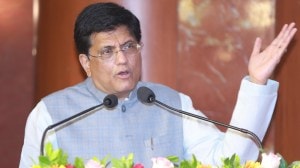Inching towards a handover
Following his latest bout with illness, Russian President Boris Yeltsin has once again disappeared into the network of country residences an...

Following his latest bout with illness, Russian President Boris Yeltsin has once again disappeared into the network of country residences and a specialised sanatorium outside Moscow. As he left for the Black Sea resort of Sochi on Friday on a 8220;recuperation8221; holiday for an unspecified duration, more power slipped into the hands of his Prime Minister, Yevgeny Primakov.
Currently, fewer and fewer people inside and outside Russia believe the ailing Yeltsin 8212; whose attention span is reportedly down to six minutes 8212; is the man in charge. His approval rating in opinion polls stands at a dismal 5 per cent, while Primakov8217;s is at 50 per cent.
Even Yeltsin8217;s top aides are acknowledging his reduced role after the President abruptly bowed out of an important European Union Summit at Vienna early last week and sent Primakov instead. Since he was approved as the Prime Minister by the State Duma in September, Primakov8217;s power has increasingly grown even as Yeltsin has become increasingly powerless.
Participatingon NTV8217;s 8220;Hero of the Day8221; programme, Yeltsin8217;s First Deputy Chief of Staff, Oleg Sysuyev, made it clear for the first time that the most important task before the President now was to turn over 8220;stable8221; power to a successor. 8220;He won8217;t be responsible for operative measures, for the day-to-day economic issues,8221; Sysuyev acknowledged. 8220;The President now concentrates on his duties as a guarantee of the Constitution.8221;
In another interview to the liberal daily newspaper Segodnya, Sysuyev said: 8220;The President has no right to be distracted by daily issues.8221; He added that Primakov8217;s Cabinet 8220;bears total responsibility for the economy8221; but that Yeltsin would also work on changes to the Constitution.
Observers see Sysuyev8217;s statement as a further sign of the growing strength of Primakov, who has broadly been handling the nuts and bolts of key Russian policy issues since the latest bout of bronchitis pushed Yeltsin to the sidelines of politics.
The President too is apparently preparing for the handover.Russian media reports say Yeltsin8217;s Chief of Staff, Valentin Ymashev, recently called a number of top journalists for a confidential meeting during which he unveiled a plan the sole purpose of which was to keep the Russian President in his post until he served out his current term. However, under the plan, Yeltsin would hand over most of his powers to Primakov, retaining largely a ceremonial role for himself. Primakov would be in charge of the economy.
Andrei Pointkovsky, Chief Analyst at Moscow8217;s Centre for Strategic Studies, calls Ymashev8217;s plan a 8220;soft resignation8221; model in which Yeltsin doesn8217;t yield to Opposition demands that he resign but at the same time stays out of day-to-day politics. The Kremlin is reportedly preparing to give a practical shape to this plan by amending the Constitution accordingly.
As concern grows over Yeltsin8217;s failing health, calls have also risen for re-instituting the vice-president8217;s post. Yeltsin had dropped such a post from the Constitution in 1993 after his first andonly vice-president, General Alexander Rutskoi, declared himself the president and led an armed rebellion. Even Communist Party leader Gennady Zyuganov and Alexander Lebed, both of whom are considering running for the presidency in 2000, have been calling for floating the post of vice-president.
Indeed, the Russian press has already started calling Primakov a de facto vice-president. Commenting on the latter8217;s successful interaction with European leaders at the Vienna summit, during his first visit to Europe as the Prime Minister, Russian correspondents even said the West treated Primakov as Yeltsin.
Primakov may get another important platform in the coming fortnight, when Japanese Prime Minister Keizo Obuchi comes calling. Earlier supposed to come for a three-day visit, Obuchi has now curtailed his trip to one day.
Under the present Russian Constitution, if Yeltsin were to die or were incapacitated, Primakov would take over for three months until the next presidential elections. As former primeminister and a presidential hopeful himself Viktor Chernomyrdin says: 8220;Today, the Prime Minister is in effect the vice-president, according to the Constitution.8221;
But as Primakov8217;s political stature grows, trouble brews for him. Some contenders for the presidency obviously fear Primakov may throw his hat into the ring, although the Prime Minister has repeatedly denied this in the past few days.
One such contender and a leading reformist, Grigory Yavlinsky, created a stir last week when he charged that some Leftist members of the Primakov Government are lobbying for Soviet-style special interests, creating more ground for corruption. Significantly, however, Yavlinsky didn8217;t attack Primakov himself, saying 8220;we only want to attract the attention of Primakov publicly that this is a real danger for his government8221;.
Yavlinsky had been the first leader in the Duma to propose Primakov8217;s name for Prime Minister as a compromise candidate to break the deadlock between Yeltsin and Parliament.
But when Primakovhad invited Yavlinsky to join his Cabinet as a vice-prime minister, the latter had refused.
Some analysts have suggested that so-called Russian 8220;oligarchs8221; 8212; or big industrialists who form a powerful lobby 8212; might be behind Yavlinsky8217;s attack. Having enjoyed political protection and influence under Chernomyrdin, they face an uncertain future under the new Prime Minister, with whom they have no close relations.
However, the only real danger to the Primakov Government could lie in the unpredictability of Yeltsin, who has so far fired two prime ministers in five months. 8220;Theoretically, I don8217;t exclude this possibility,8221; says Andrei Ryabov of the Moscow Carnegie Centre. 8220;But Yeltsin has lost political capital, which would be very hard for him to get back.8221;
Already, the Communist-dominated State Duma is seeking to amend the 1993 Constitution in order to wrest power from the President. Communist leaders have also demanded that a Constituent Assembly be called to effect the changes to restrictYeltsin8217;s powers and to turn over some of these to the Cabinet and Parliament. However, Sysuyev made it clear during his interview that Yeltsin would resist any such attempts.Analysts see a game plan in this tug of war too. They feel the Kremlin is cleverly trying to drag the process for as long as possible, hoping that in the meantime, the political pressure on Yeltsin to resign or face impeachment would recede.
- 01
- 02
- 03
- 04
- 05































